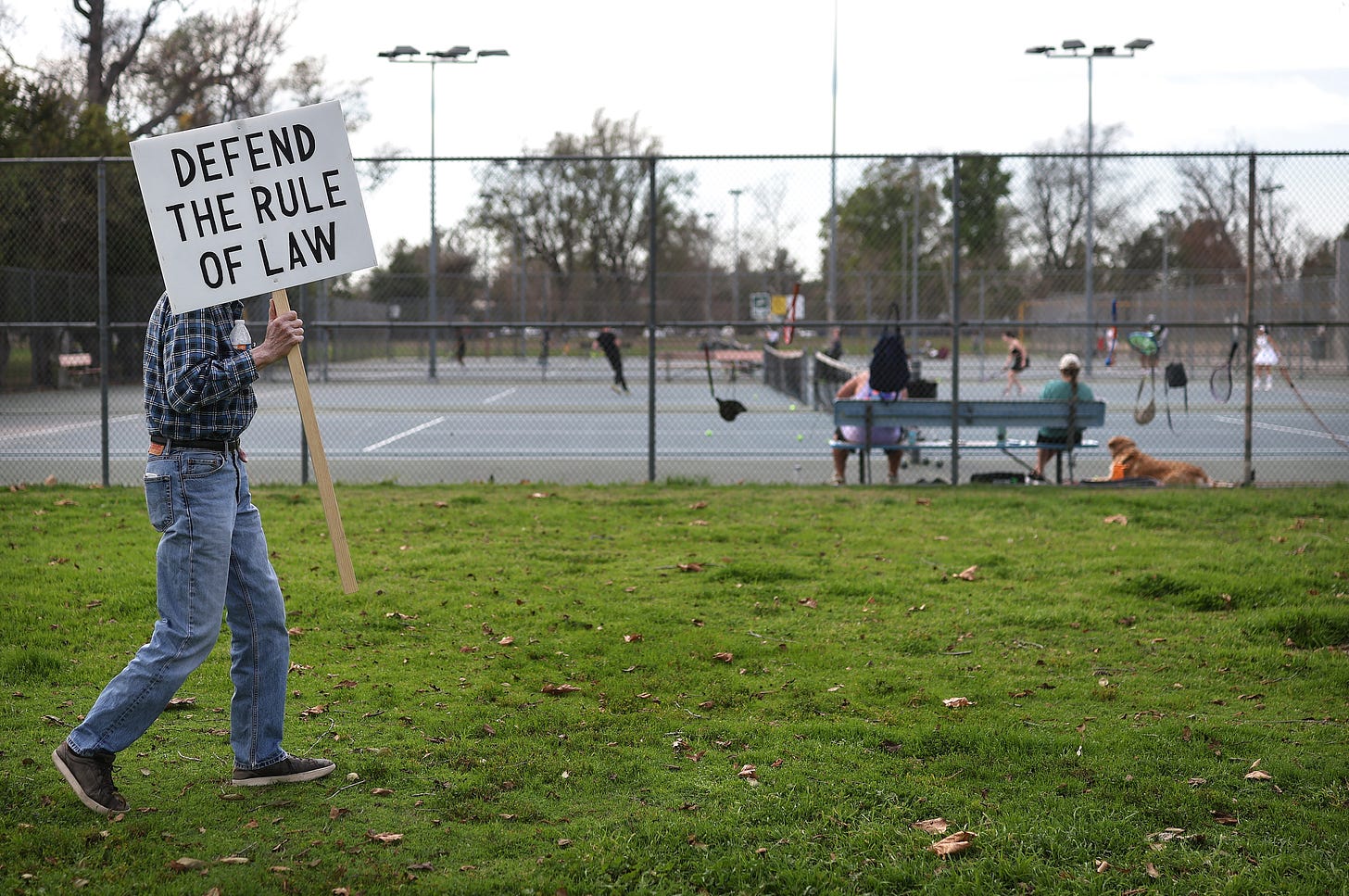An Open Society Requires Constant Vigilance
Liberalism is built on paradoxes—but we have a duty to defend it.
“Why Liberalism” is an ongoing series by Persuasion in collaboration with the Institute for Humane Studies. Today, Roger Partridge makes the case—more relevant than ever—that only active civic engagement can save liberal democracies from creeping authoritarianism. He draws on J.S. Mill to argue that it is practical necessity, not abstract duty, that should compel us to do the hard work of sustaining a liberal political culture.
As a companion to this piece, you might also like today’s blog post by Francis Fukuyama on abundance and community. Make sure you opt into recieving future emails from the Frankly Fukuyama blog by clicking here and toggling on the relevant option under “notifications.”
And to receive future installments of “Why Liberalism” directly into your inbox, and sustain our ability to publish more series like this, please consider becoming a paying subscriber to Persuasion today!
Who is responsible for defending liberal democracy when its norms come under attack? The philosopher Karl Popper, writing as fascist armies swept Europe, understood this was not an abstract question. Popper championed societies that were fundamentally “open”—sustained by critical inquiry and peaceful disagreement, rather than imposed unity. But Popper grasped a paradox: openness could survive only if actively defended against those who would exploit its openness to destroy it.
Popper also recognized what he called the “strain” of civilization—the psychological burden that freedom places on individuals who must think and choose for themselves rather than submit to authority. This burden reveals another paradox: liberal values run counter to humanity’s evolutionary inheritance. We evolved in small groups where conformity and deference to authority aided survival. Liberal democracy demands the opposite—individual judgment, tolerance of dissent, and restraint of power.
These paradoxes reveal something crucial: liberal society does not survive by default. It achieves unprecedented peace, prosperity, and freedom by trusting citizens rather than commanding them. But the same qualities that make freedom precious also make it fragile: liberalism liberates human potential, yet only by demanding more vigilance and responsibility than instinct alone provides.
Critics like theologian R.R. Reno see this vulnerability as proof of the open society’s shortcomings. Reno argues that Popperian openness cast out the very ideals that once gave liberalism cohesion—the so-called “strong gods” of religion and nationalism. The result, Reno argues, is a hollow society, adrift because its openness is morally empty. The pseudonymous writer N.S. Lyons makes a similar case, arguing that the open society consensus and its soft, weak gods have led to “civilizational dissolution and despair.”
In my essay “Classical Liberalism Without Strong Gods,” I argued that these criticisms are misdirected. Liberalism is not failing because it is too open but because its beneficiaries have neglected the civic, cultural, and institutional foundations that give openness depth. Postmodern scepticism about truth and shared values has compounded the problem. The consequence has been societies that are liberal in name but hollow in practice.
But there is a deeper question I left largely unspoken: who is responsible for keeping the open society open? When democratic institutions are under pressure—when norms erode or are challenged outright—do liberals have obligations to act?
The Contemporary Challenge
Today’s threats to liberal democracy are more subtle than those Popper had in mind in the 1930s and 40s, but no less real. They come from two directions: populist authoritarianism on the right and progressive illiberalism on the left.
Populist strongmen no longer arrive in uniforms chanting slogans but hollow out democratic institutions from within. They advance not through revolution but through what political scientists Steven Levitsky and Lucan Way call “competitive authoritarianism”: regimes that maintain the forms of democracy while steadily destroying its substance. This pattern is visible across the globe, from Viktor Orbán’s systematic dismantling of press freedom in Hungary to President Trump’s efforts to rewrite constitutional norms by decree.
Progressive illiberalism poses a second corrosive challenge to democratic norms. It manifests in the systematic suppression of debate on university campuses, the weaponization of social pressure to enforce ideological conformity, and the redefinition of disagreement as harm.
In both cases, liberal norms erode through everyday accommodation as much as through dramatic confrontation. This state of affairs reveals liberalism’s essential vulnerability: It is not a self-perpetuating system but a series of active choices made by individuals in positions of responsibility. When university administrators surrender to activist pressure rather than defend free inquiry, they choose institutional peace over academic freedom. When journalists prioritize narrative over accuracy to avoid social media backlash, they choose professional safety over informed debate. When politicians abandon constitutional restraints because their opponents have done the same, they opt for short-term political gains over democratic stability.
Each choice may seem small, defensible, even reasonable. But the cumulative effect is the erosion of the liberal culture that makes democracy work.
A Consequentialist Case for Civic Duty
This erosion is not inevitable. Liberal democracy has survived previous challenges because enough people recognized they had a stake in defending it. That stake creates responsibility—not as a matter of abstract duty or metaphysical rights, but because of what happens when liberalism’s institutions are neglected.
Liberal institutions exist because people built them, defended them, and passed them on. But they persist only as long as people continue to do so. There is no natural law that protects freedom of speech, no invisible hand that maintains the rule of law. These are human achievements that require human maintenance.
Liberal democracy cannot function without a critical mass of citizens who are willing to uphold its norms, resist its erosion, and transmit its habits to the next generation.
This civic responsibility to speak out is not one that can be legally enforced. But nor is it merely a matter of private virtue. It is more like the duty to vote, to speak the truth in public, or to keep a social promise—a moral responsibility grounded in the consequences of inaction. Without active engagement, the conditions that protect individual rights and liberal institutions will inevitably deteriorate.
John Stuart Mill understood this logic perfectly. In his 1867 inaugural address at St Andrews University, Mill delivered one of the most direct statements of civic responsibility in the liberal canon: “Bad men need nothing more to compass their ends, than that good men should look on and do nothing.” Mill did not appeal to divine command or abstract virtue. Rather, he made a utilitarian calculation: the modest cost of civic engagement was far less than the catastrophic cost of losing freedom to those who would destroy it.
The Problem of Collective Action
So, why don’t good people act, even when they see the danger? The answer lies partly in the logic of collective action. Democratic defence is a public good: everyone benefits from it, but no individual captures enough of the benefit to justify the personal cost of providing it.
Speaking up against illiberal trends carries real risks. Social opprobrium. Professional consequences. Personal stress. The temptation is to assume that someone else will do it—that the institutional guardrails will hold, that the crisis will pass, that normal politics will resume.
But this logic, multiplied across thousands of individuals, produces precisely the collective passivity that facilitates democratic erosion. Everyone waits for someone else to act. Meanwhile, those seeking to undermine liberal norms face no such coordination problems. Their incentives align. Their actions reinforce each other.
This is a classic “free rider problem.” The benefits of defending liberal democracy are diffuse and long-term. The costs are immediate and personal. Without some mechanism to overcome this imbalance, the system tilts toward those willing to pay the costs of political action—often those seeking to tear the system down rather than build it up.
Yet, if liberal democracy produces better outcomes than the alternatives—creating more prosperity, protecting more freedom, enabling more human flourishing—then those who benefit from it bear a responsibility for its upkeep. Not because of abstract duty, but because of practical necessity.
And that responsibility must fall most heavily on those with greater influence, education, or awareness of liberalism’s fragility.
What Defence Requires
What does defending liberal democracy actually require? The specifics differ by context, but the underlying logic remains the same: liberal democracy rests not just on laws, but on habits—practices of citizenship that reinforce its norms from below.
First, it requires intellectual honesty. Liberal democracy depends on the possibility of reasoned debate between people who disagree. This means resisting the temptation to excuse illiberal behaviour when it serves your preferred outcomes. It means calling out demagoguery on your own side as well as the other. It means acknowledging uncomfortable facts and rejecting convenient fictions, even when truth-telling comes at personal or political cost.
Second, it requires civility. When partisans treat political opponents as enemies rather than fellow citizens, they undermine the foundation of democratic politics. It means defending the rights of people you disagree with, because rights that apply only to allies are not rights at all.
Third, it requires civic engagement. Democracy is not a spectator sport. It requires informed participation by ordinary citizens. This means more than voting, though it includes that. It means staying informed about public issues. It means participating in civic organizations. It means treating citizenship as an active responsibility rather than a passive status. As Mill wrote in On Liberty, “The worth of a state in the long run is the worth of the individuals composing it.”
Fourth, it requires defending institutional norms even when they produce outcomes you dislike. The rule of law, separation of powers, and protection of minority rights are not obstacles to democracy—they are preconditions for it. Weakening these constraints to achieve short-term political goals damages the system that makes peaceful political competition possible.
Finally, it requires confronting illiberalism wherever it appears. Karl Popper’s paradox of tolerance applies here: unlimited tolerance leads to the disappearance of tolerance. A liberal society must be prepared to defend itself against those who would destroy it.
As Popper warned in The Open Society and Its Enemies: “If we are not prepared to defend a tolerant society... then the tolerant will be destroyed, and tolerance with them.”
This does not mean abandoning persuasion for coercion. It means understanding that persuasion works only with people prepared to be persuaded. Those who reject the basic norms of democratic participation—who use violence, suppress opposition, or refuse to accept electoral defeat—place themselves outside the boundaries of legitimate political competition.
Liberalism’s challenge
Liberal democracy will endure only if those who benefit from it are willing to defend it. The costs of vigilance are modest compared to the alternative: societies that abandon liberal norms become poorer, less innovative, and less free.
Mill’s warning remains as relevant today as it was in 1867. The price of the open society is eternal vigilance. But the alternative is a society that is neither open nor worth defending.
Roger Partridge is a founder and senior fellow of The New Zealand Initiative and writes on public policy, constitutional law and liberalism. He publishes on Substack at Plain Thinking.
Also in Why Liberalism:
The “Why Liberalism” series is a project by Persuasion in partnership with the Institute for Humane Studies (IHS). IHS is a non-profit organization that promotes a freer, more humane, and open society by connecting and supporting talented graduate students, scholars, and other intellectuals who are advancing the principles and practice of freedom. For additional information and details, media, programmatic, and funding opportunities, visit TheIHS.org.
Follow Persuasion on X, LinkedIn, and YouTube to keep up with our latest articles, podcasts, and events, as well as updates from excellent writers across our network.
And, to receive pieces like this in your inbox and support our work, subscribe below:









"The philosopher Karl Popper, writing as fascist armies swept Europe"
Why is there this fixation on fascism when the primary scourge against liberalism has been collectivism? Collectivism attempts have murdered more, starved more, imprisoned more that has fascism... many millions more.
The primary threat to true liberalism today is collectivism... socialism, Marxism, communism... not what is only a pull by the majority to get back to some rational national industrial policy that provides some reasonable socioeconomic opportunity for the citizens.
I would add another threat that is ignored... the more modern one... it is corporatism... or in the case the evolution of the global corporatocracy. Wall Street rules the world and it prefers an end to liberalism as it tends to impact their profits and shareholder returns.
"Liberal democracy cannot function without a critical mass of citizens who are willing to uphold its norms, resist its erosion, and transmit its habits to the next generation."
Underlying the question of willingness is the assumption of intellectual competence: nothing brilliant, just a robust mind with habits of curiosity and critical thinking. Without that, it's hard to summon the resources to uphold, resist, and transmit; or even to notice the need to do so. Thomas Jefferson was uneasy on that head:
"Above all things I hope the education of the common people will be attended to; convinced that on their good sense we may rely with the most security for the preservation of a due degree of liberty."
-- Letter to James Madison, December 20, 1787
John Locke just assumed that the participants in democracy would be functionally rational:
"[Locke] insisted ... that the test for participation in government was the possession, not of property, which he assumed all men should have, but of reason. ... Locke insisted, and it is an important point, that man has no right to the exercise of his freedom until he attains the use of his reason; that is, until the child grows into the adult. Freedom without reason is mere license."
-- J. Bronowski and Bruce Mazlish, The Western Intellectual Tradition
Attaining the use of our reason is not something that just happens over time, either. It takes at least a conscientious effort. Political power may be a God-given right, but political wisdom is not a God-given power.
https://thefamilyproperty.blogspot.com/2025/08/the-family-secret.html